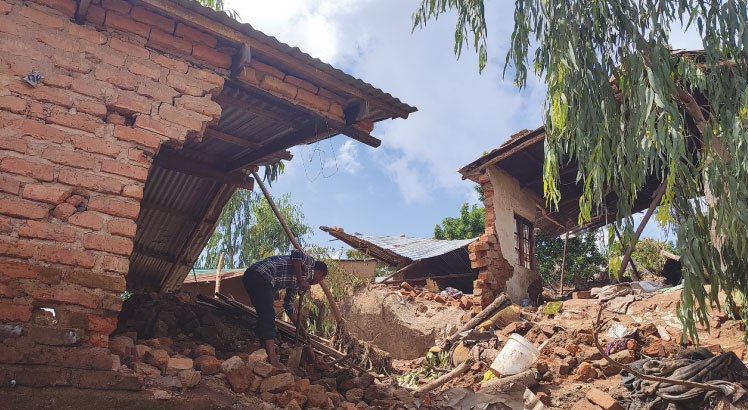Women leading in climate change adaptation efforts
 Margaret Macheso, 59, shook with anger at the mere mention of climate change during a visit by Richie Muheya, Minister of Water Development and Irrigation, to her village in southern Malawi.
Margaret Macheso, 59, shook with anger at the mere mention of climate change during a visit by Richie Muheya, Minister of Water Development and Irrigation, to her village in southern Malawi.
Even with clear skies above Kalinde Village, Traditional Authority Kaduya in Phalombe, her fury was evident on Friday afternoon, August 17. The object of her anger is the rising temperatures, crop failure and changes in rainfall patterns that seem to have conspired to make her life harder. Last growing season, she lost all her maize crop to intense dry spells that swept across the district.
The situation is different from 40 years ago when she first settled in the area as a young girl.
Poor rainfall in southern Malawi, including Phalombe, resulted in significant crop yield reductions with parts of some districts experiencing total crop failure.
“We should all take blame for what is happening,†she adds, referring to climate challenges, which she blames for pushing communities to the edge.
“We can no longer produce enough food. Animal stocks have decreased and the farmlands are no longer productive. We are running out of options,†the farmer said.
Macheso says people’s increasing inability to feed their families is a cause for worry, what with chronic droughts and famine that have left more than 1.63 million of people in the country reliant on relief food from the government and UN agencies.
Irrigation intervention
She, however, has solace in the irrigation scheme, Ulesi Siupindula.
Macheso is among 68 females that are leading a fight against climate change effects by devoting their time to Ulesi Siupindula Irrigation Scheme in T/A Kaduya in Phalombe. There are also 44 males at the scheme.
Phalombe might be a model to other districts where out of 8 566 beneficiaries, 4 317 are females (representing 50.3 percent).
She said women and girls today bear most of the burden in activities that are most impacted by adverse climate, because they are primary providers of a number of household essentials such as water, firewood for energy and food.
“If it were not for this small piece of land, I don’t know how much suffering my family would be going through now,†she said. “Now we have to be here every day to irrigate the maize and tomatoes to feed ourselves.â€
Farmers at the scheme acknowledge that without their intervention, agricultural productivity in the area would be at stake.
Agnes Jamuteni, a single mother of four, said most families are hounded by poverty linked to climate change.
“There is extreme poverty in the villages, but we are lucky we have somewhere to turn to. The scheme has provided us an opportunity to produce more and become food secure despite the changing climate,†she said.
Jamuteni said she sells some of her produce and she has bought goats which are also multiplying, increasing her resilience to climate change.
T/A Kaduya said for decades, life was simple among his subjects, but recently, evidence of climate change such as the rising temperatures, total crop failure and changes in rainfall patterns have pushed them to the edge.
“Climate change has brought about unpredictable weather patterns. Recurring droughts have depleted the once plenty pasture land and demand for land is higher as population expands,†said Kaduya.
T/A Chiwalo, whose subjects also participate in the agricultural activities at the scheme, said it has not been easy for his subjects to pick a new economic activity other than farming because of climate change.
“Time has turned things upside down,†he said. “For years, we have watched helplessly as rough weather decimated our prized farms.â€
Muheya said the purpose of his visit to the scheme was to appreciate what farmers are doing which he described as very commendable.
“Irrigation is carried out to ensure sustained productivity for food security, effective poverty alleviation and national economic development.





